Unit 10 If you go to the party, you'll have a great timeSection A Grammar Focus-3c教学课件(共30张PPT) 人教版
文档属性
| 名称 | Unit 10 If you go to the party, you'll have a great timeSection A Grammar Focus-3c教学课件(共30张PPT) 人教版 | 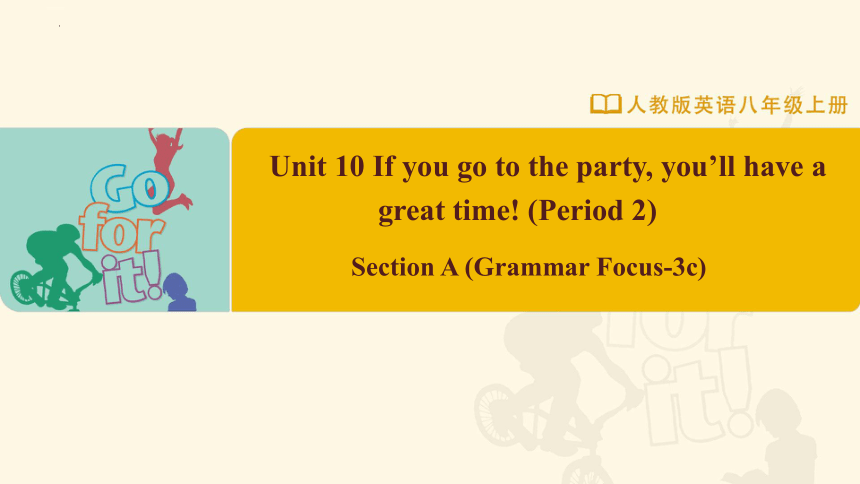 | |
| 格式 | pptx | ||
| 文件大小 | 2.4MB | ||
| 资源类型 | 教案 | ||
| 版本资源 | 人教新目标(Go for it)版 | ||
| 科目 | 英语 | ||
| 更新时间 | 2023-10-03 19:54:34 | ||
图片预览

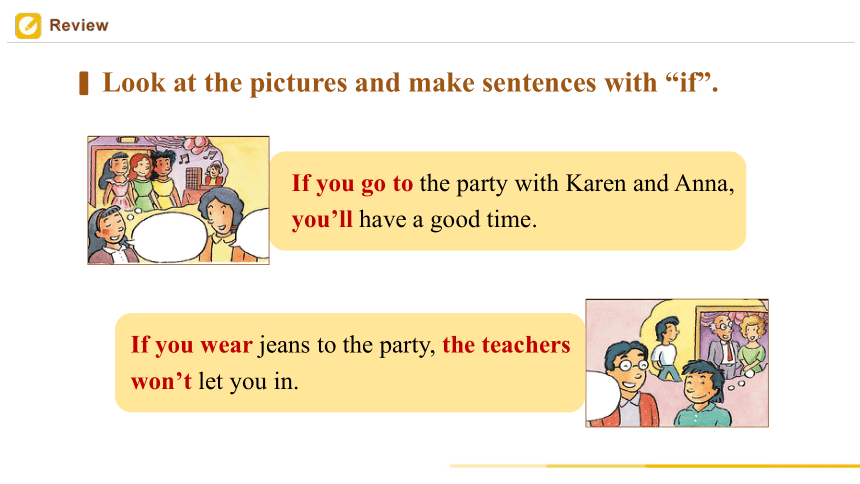
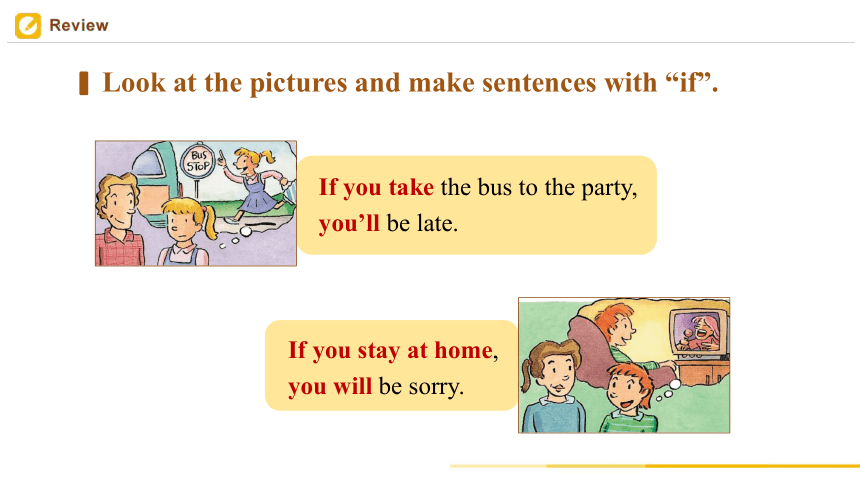
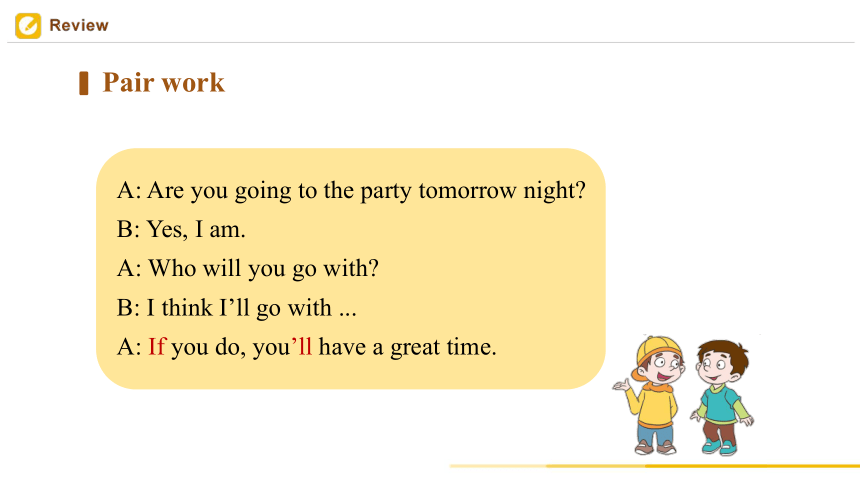
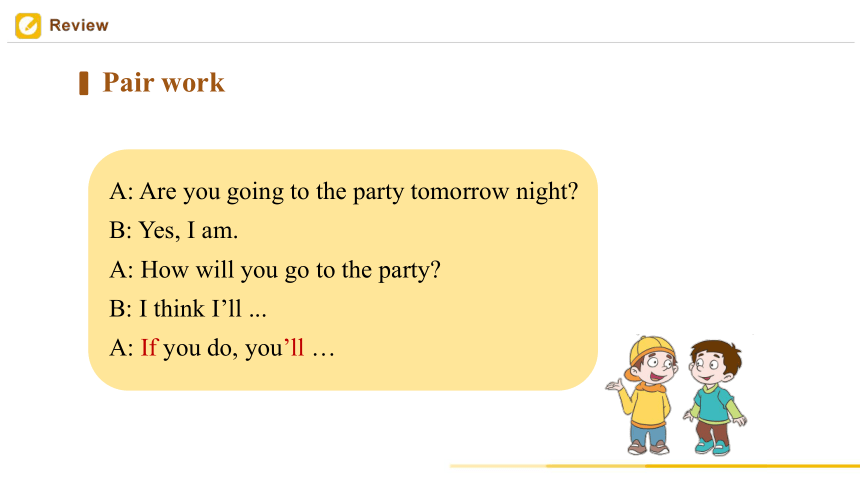
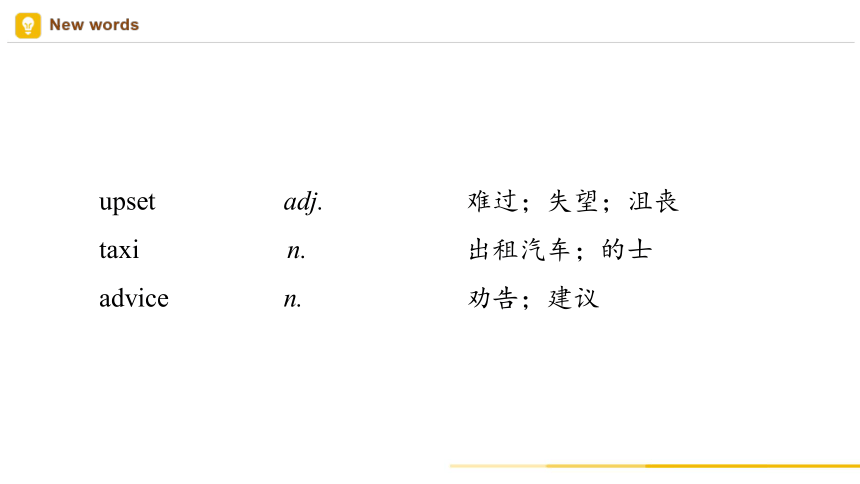
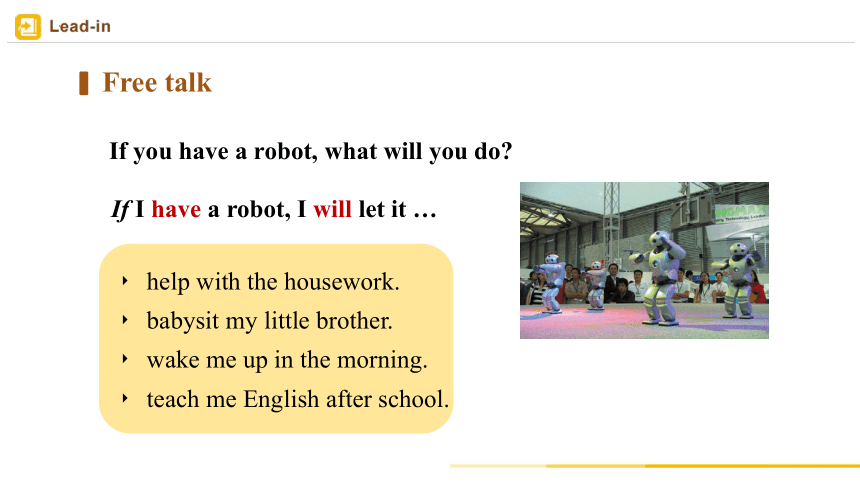
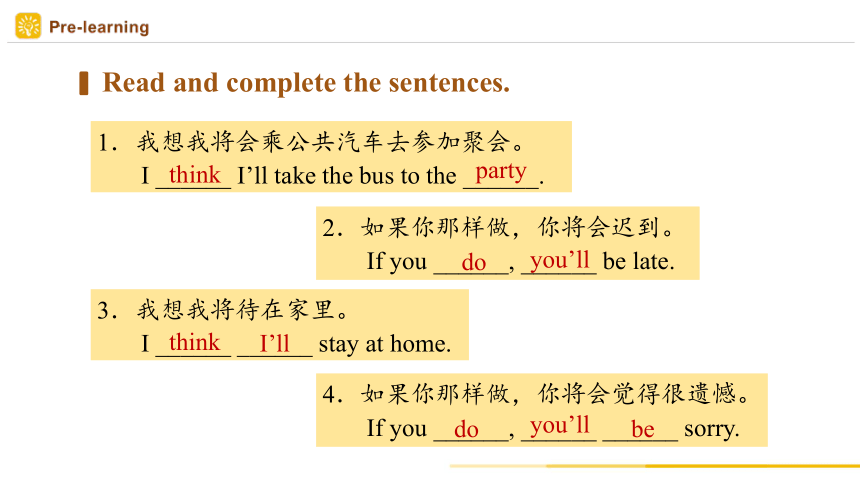
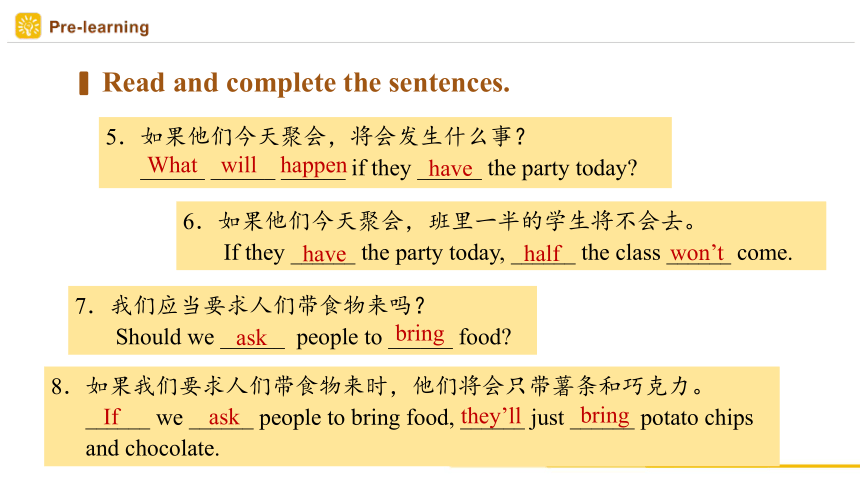
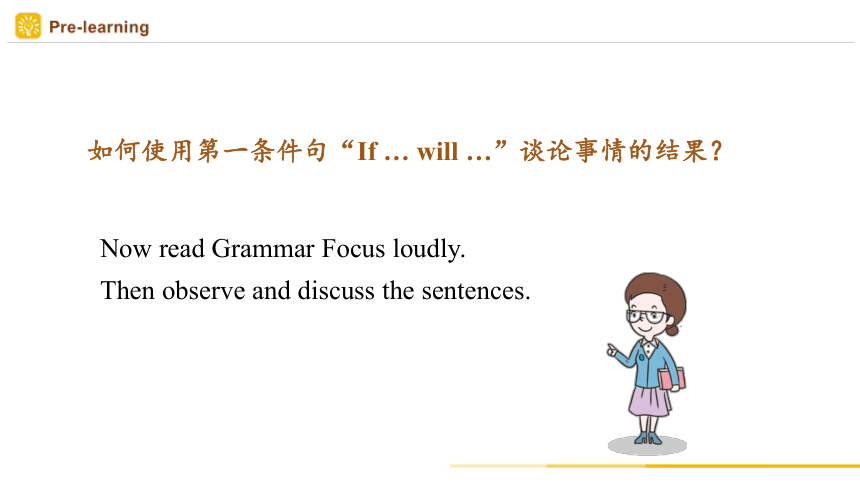
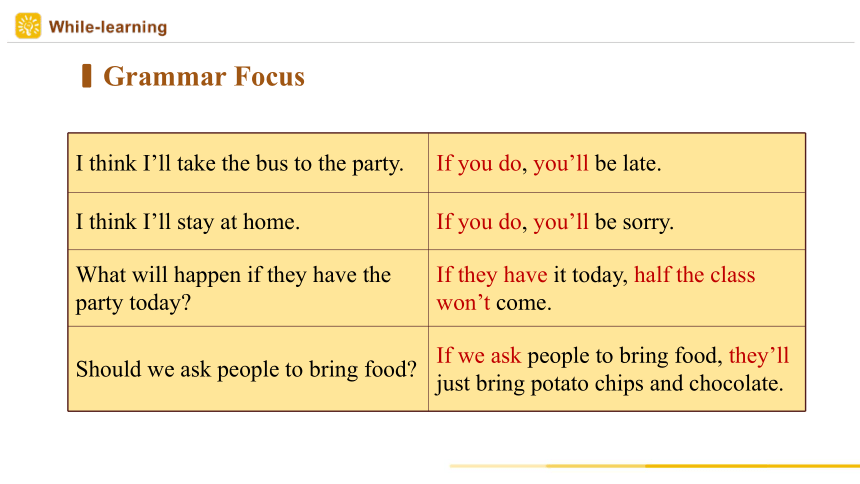
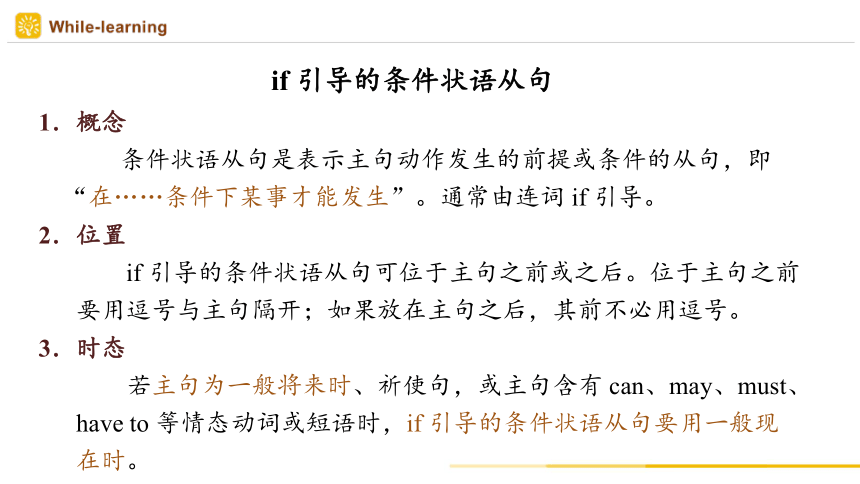
文档简介
(共30张PPT)
Unit 10 If you go to the party, you’ll have a
great time! (Period 2)
Section A (Grammar Focus-3c)
Look at the pictures and make sentences with “if”.
If you go to the party with Karen and Anna, you’ll have a good time.
If you wear jeans to the party, the teachers won’t let you in.
Look at the pictures and make sentences with “if”.
If you take the bus to the party,
you’ll be late.
If you stay at home,
you will be sorry.
Pair work
A: Are you going to the party tomorrow night
B: Yes, I am.
A: Who will you go with
B: I think I’ll go with ...
A: If you do, you’ll have a great time.
Pair work
A: Are you going to the party tomorrow night
B: Yes, I am.
A: How will you go to the party
B: I think I’ll ...
A: If you do, you’ll …
upset adj.
taxi n.
advice n.
难过;失望;沮丧
出租汽车;的士
劝告;建议
Free talk
If you have a robot, what will you do
help with the housework.
babysit my little brother.
wake me up in the morning.
teach me English after school.
If I have a robot, I will let it …
1.我想我将会乘公共汽车去参加聚会。
I ______ I’ll take the bus to the ______.
Read and complete the sentences.
2.如果你那样做,你将会迟到。
If you ______, ______ be late.
3.我想我将待在家里。
I ______ ______ stay at home.
4.如果你那样做,你将会觉得很遗憾。
If you ______, ______ ______ sorry.
think
party
do
you’ll
think
I’ll
do
you’ll
be
5.如果他们今天聚会,将会发生什么事?
______ ______ ______ if they ______ the party today
Read and complete the sentences.
What will happen
have
6.如果他们今天聚会,班里一半的学生将不会去。
If they ______ the party today, ______ the class ______ come.
7.我们应当要求人们带食物来吗?
Should we ______ people to ______ food
8.如果我们要求人们带食物来时,他们将会只带薯条和巧克力。
______ we ______ people to bring food, ______ just ______ potato chips
and chocolate.
have
won’t
half
ask
bring
If
ask
they’ll
bring
如何使用第一条件句“If … will …”谈论事情的结果?
Now read Grammar Focus loudly.
Then observe and discuss the sentences.
I think I’ll take the bus to the party. If you do, you’ll be late.
I think I’ll stay at home. If you do, you’ll be sorry.
What will happen if they have the party today If they have it today, half the class
won’t come.
Should we ask people to bring food If we ask people to bring food, they’ll just bring potato chips and chocolate.
Grammar Focus
if 引导的条件状语从句
1.概念
条件状语从句是表示主句动作发生的前提或条件的从句,即
“在……条件下某事才能发生”。通常由连词 if 引导。
2.位置
if 引导的条件状语从句可位于主句之前或之后。位于主句之前
要用逗号与主句隔开;如果放在主句之后,其前不必用逗号。
3.时态
若主句为一般将来时、祈使句,或主句含有 can、may、must、
have to 等情态动词或短语时,if 引导的条件状语从句要用一般现
在时。
if 引导的条件状语从句
e.g. If it rains tomorrow, I won’t go hiking.
= I won’t go hiking if it rains tomorrow.
如果明天下雨,我就不去远足。
If he watches TV, I will watch TV, too.
如果他看电视,我也会看电视。
Get up quickly if you don’t want to be late.
如果你不想迟到,就快点儿起床。
You can pass the exam if you study hard.
如果努力学习,你就能通过这次考试。
if 条件句不一般,
几个要点记心间;
条件句,放在前,
逗号要放句中间;
条件句表可能,
主将从现是关键。
巧学妙记
if 引导的条件状语从句
提醒
(1)if 引导的条件状语从句,通常可与以下句型相互转换:
①祈使句 + and/or + 一般将来时的句子
e.g. If you are quick, you won’t be late for class.
= Be quick, and you won’t be late for class.
②含有介词 with 或 without 的句子
e.g. If there is no water, we can’t live. = We can’t live without water.
(2)if 除可引导条件状语从句外,还可引导宾语从句,意为“是否”。
e.g. I don’t know if he will come to Jim’s birthday party tomorrow.
if 引导的条件状语从句
典例
点拨
可用语法判断法解答本题。句意:——我想我会坐公交车去参加会议。——公交车?如果你这样做的话,你就会迟到。if 引导的条件状语从句的时态遵循“主将从现”原则,此处空格后的主句用的一般将来时,if 从句要用一般现在时。
1.—I think I’ll take a bus to the meeting.
—The bus If you ______, you will be late.
A.do B.have done C.will do D.did
A
if 引导的条件状语从句
典例
点拨
可用词义辨析法解答本题。句意:假如你去参加聚会的话,你就会玩得很开心。so 表示因果;if 表示条件;although 表示让步。因此,正确答案是B。
2.You’ll have a great time ______ you go to the party.
A.so B.if C.although D.and
B
Finish the following sentences according to the example.
he, come, next weekend
not rain
he, have free time
I, tell you
go hiking, this afternoon
go to Shanghai
she, call me
if
I, tell her about it
will
If she calls me, I will tell her about it.
Example:
Finish the following sentences according to the example.
he, come, next weekend
not rain
he, have free time
I, tell you
go hiking, this afternoon
go to Shanghai
if
will
If he comes next weekend, I will tell you.
If it doesn’t rain, I will go hiking this afternoon.
If he has free time, he will go to Shanghai.
Fill in the blanks with the correct forms of the verbs in brackets.
3a
Dear Su Mei,
I don’t ______(know) what to _____(do) about going to Mike’s birthday party tomorrow night. My parents ______(think) I should study for my English exam next week. If I ______(go) to the party, they ________(be) upset. Mike ______(tell) us to wear nice clothes, but I don’t ______(have) any. If I _____(wear) jeans, I _________(look) the worst. Also, I’m not sure how to ____(go) to the party. If I ______(walk), it ________(take) me too long. If I ______(take) a taxi, it ________(be) too expensive. Can you give me some advice please
Tina
know
do
think
go
will be
told
have
wear
will look
go
walk
will take
take
will be
Group work
Talk in groups about Tina’s worries using the sentences with “if”.
Tina’s worries:
to go or not to go
what to wear
how to get there
If Tina goes to the party, her parents will …
If Tina wears jeans, she will …
If Tina takes a taxi, it will …
Let’s give Tina some advice.
If her parents don’t let her go to the party, she will …
If she thinks wearing jeans looks worst, she will …
If she thinks taking a taxi is too expensive, she will …
Complete the sentences using your own ideas.
3b
1.If I get up late tomorrow, _______________________________
2.If I don’t finish my homework, __________________________
3.If I don’t get enough exercise, ___________________________
4.I will not have enough time to study if ____________________
5.I will not make any friends if ___________________________
Write a story with your group on a piece of paper. The
first person begins the story with “I think I will …” The others add sentences with “if”. Pass the paper around
twice. Then read the story.
3c
I think I will go to the movies tonight. If I go to the movies, I won’t finish my homework. If I don’t finish my homework …
1.If I go to the party, they will be upset. 如果我去参加聚会,他们会失望的。
upset 形容词,意为“难过;失望;沮丧”,在句中作表语。
e.g. The little boy got quite upset. 这个小男孩很失望。
—You look upset, Mike. What’s wrong 迈克,你看起来很沮丧。怎么了?
—I lost my watch. 我丢了手表。
拓展
up构成的的常用搭配
be upset about sth. 对……感到心烦
be upset with sb. 生某人的气
e.g. I was so upset about what happened yesterday.
我对昨天发生的事感到很苦恼。
Don’t be upset with me. 不要生我的气。
2.If I take a taxi, it will be too expensive. 如果我乘出租车,会很贵。
take a taxi 表示“乘出租车”,其中 take 意为“搭乘”,与交通工具
名词搭配时,名词前要用冠词。
e.g. I often take a taxi to school. 我经常乘出租车上学。
拓展
①“by + 交通工具名词”表示“骑/乘……” ,此时表示交通工具
的名词只能用单数,且其前不加冠词或形容词性物主代词。
e.g. My brother goes to work by bike. 我哥哥骑自行车去上班。
其他表示“乘坐交通工具”的方法
2.If I take a taxi, it will be too expensive. 如果我乘出租车,会很贵。
拓展
②“on/in + 限定词 + 交通工具名词”表示“骑/乘……” ,此时
表示交通工具的名词只能用单数,且其前要加冠词或形容词性
物主代词等限定词。
e.g. My brother goes to work on his bike. 我哥哥骑自行车去上班。
Tim goes to work in a car every day. 蒂姆每天开车去上班。
3.Can you give me some advice please 你能给我一些建议吗?
(1)advice 是不可数名词,意为“劝告;建议”,可用 some、a piece of、
pieces of 等来修饰。
e.g. Lucy came up with a piece of advice. 露西提出了一条建议。
(2)give sb. some advice = give some advice to sb. 表示“给某人一些建议”。
e.g. Let me give you some advice. 让我给你一些建议。
拓展
①ask sb. for advice 意为“征求某人的意见;向某人寻求建议”。
e.g. She often asks me for advice. 她经常征求我的意见。
②表示“有关……的建议”时用介词 on,其后接名词、代词、动词-ing
形式或“疑问词 + to do”结构。
e.g. He gave us some advice on learning. 他给了我们一些有关学习的建议。
upset、taxi、advice
生词
预测事情
的结果
(1)If ..., you’ll …
(2) —What will happen if they …
—If they …, … will/won’t …
(3) —Should we …
—If we …, they’ll …
if 引导的条件状语从句
语法
1.Write some sentences using the structure “if … will ...”.
2.Complete the story in 3c in groups. Then read it in front of
the class.
Unit 10 If you go to the party, you’ll have a
great time! (Period 2)
Section A (Grammar Focus-3c)
Look at the pictures and make sentences with “if”.
If you go to the party with Karen and Anna, you’ll have a good time.
If you wear jeans to the party, the teachers won’t let you in.
Look at the pictures and make sentences with “if”.
If you take the bus to the party,
you’ll be late.
If you stay at home,
you will be sorry.
Pair work
A: Are you going to the party tomorrow night
B: Yes, I am.
A: Who will you go with
B: I think I’ll go with ...
A: If you do, you’ll have a great time.
Pair work
A: Are you going to the party tomorrow night
B: Yes, I am.
A: How will you go to the party
B: I think I’ll ...
A: If you do, you’ll …
upset adj.
taxi n.
advice n.
难过;失望;沮丧
出租汽车;的士
劝告;建议
Free talk
If you have a robot, what will you do
help with the housework.
babysit my little brother.
wake me up in the morning.
teach me English after school.
If I have a robot, I will let it …
1.我想我将会乘公共汽车去参加聚会。
I ______ I’ll take the bus to the ______.
Read and complete the sentences.
2.如果你那样做,你将会迟到。
If you ______, ______ be late.
3.我想我将待在家里。
I ______ ______ stay at home.
4.如果你那样做,你将会觉得很遗憾。
If you ______, ______ ______ sorry.
think
party
do
you’ll
think
I’ll
do
you’ll
be
5.如果他们今天聚会,将会发生什么事?
______ ______ ______ if they ______ the party today
Read and complete the sentences.
What will happen
have
6.如果他们今天聚会,班里一半的学生将不会去。
If they ______ the party today, ______ the class ______ come.
7.我们应当要求人们带食物来吗?
Should we ______ people to ______ food
8.如果我们要求人们带食物来时,他们将会只带薯条和巧克力。
______ we ______ people to bring food, ______ just ______ potato chips
and chocolate.
have
won’t
half
ask
bring
If
ask
they’ll
bring
如何使用第一条件句“If … will …”谈论事情的结果?
Now read Grammar Focus loudly.
Then observe and discuss the sentences.
I think I’ll take the bus to the party. If you do, you’ll be late.
I think I’ll stay at home. If you do, you’ll be sorry.
What will happen if they have the party today If they have it today, half the class
won’t come.
Should we ask people to bring food If we ask people to bring food, they’ll just bring potato chips and chocolate.
Grammar Focus
if 引导的条件状语从句
1.概念
条件状语从句是表示主句动作发生的前提或条件的从句,即
“在……条件下某事才能发生”。通常由连词 if 引导。
2.位置
if 引导的条件状语从句可位于主句之前或之后。位于主句之前
要用逗号与主句隔开;如果放在主句之后,其前不必用逗号。
3.时态
若主句为一般将来时、祈使句,或主句含有 can、may、must、
have to 等情态动词或短语时,if 引导的条件状语从句要用一般现
在时。
if 引导的条件状语从句
e.g. If it rains tomorrow, I won’t go hiking.
= I won’t go hiking if it rains tomorrow.
如果明天下雨,我就不去远足。
If he watches TV, I will watch TV, too.
如果他看电视,我也会看电视。
Get up quickly if you don’t want to be late.
如果你不想迟到,就快点儿起床。
You can pass the exam if you study hard.
如果努力学习,你就能通过这次考试。
if 条件句不一般,
几个要点记心间;
条件句,放在前,
逗号要放句中间;
条件句表可能,
主将从现是关键。
巧学妙记
if 引导的条件状语从句
提醒
(1)if 引导的条件状语从句,通常可与以下句型相互转换:
①祈使句 + and/or + 一般将来时的句子
e.g. If you are quick, you won’t be late for class.
= Be quick, and you won’t be late for class.
②含有介词 with 或 without 的句子
e.g. If there is no water, we can’t live. = We can’t live without water.
(2)if 除可引导条件状语从句外,还可引导宾语从句,意为“是否”。
e.g. I don’t know if he will come to Jim’s birthday party tomorrow.
if 引导的条件状语从句
典例
点拨
可用语法判断法解答本题。句意:——我想我会坐公交车去参加会议。——公交车?如果你这样做的话,你就会迟到。if 引导的条件状语从句的时态遵循“主将从现”原则,此处空格后的主句用的一般将来时,if 从句要用一般现在时。
1.—I think I’ll take a bus to the meeting.
—The bus If you ______, you will be late.
A.do B.have done C.will do D.did
A
if 引导的条件状语从句
典例
点拨
可用词义辨析法解答本题。句意:假如你去参加聚会的话,你就会玩得很开心。so 表示因果;if 表示条件;although 表示让步。因此,正确答案是B。
2.You’ll have a great time ______ you go to the party.
A.so B.if C.although D.and
B
Finish the following sentences according to the example.
he, come, next weekend
not rain
he, have free time
I, tell you
go hiking, this afternoon
go to Shanghai
she, call me
if
I, tell her about it
will
If she calls me, I will tell her about it.
Example:
Finish the following sentences according to the example.
he, come, next weekend
not rain
he, have free time
I, tell you
go hiking, this afternoon
go to Shanghai
if
will
If he comes next weekend, I will tell you.
If it doesn’t rain, I will go hiking this afternoon.
If he has free time, he will go to Shanghai.
Fill in the blanks with the correct forms of the verbs in brackets.
3a
Dear Su Mei,
I don’t ______(know) what to _____(do) about going to Mike’s birthday party tomorrow night. My parents ______(think) I should study for my English exam next week. If I ______(go) to the party, they ________(be) upset. Mike ______(tell) us to wear nice clothes, but I don’t ______(have) any. If I _____(wear) jeans, I _________(look) the worst. Also, I’m not sure how to ____(go) to the party. If I ______(walk), it ________(take) me too long. If I ______(take) a taxi, it ________(be) too expensive. Can you give me some advice please
Tina
know
do
think
go
will be
told
have
wear
will look
go
walk
will take
take
will be
Group work
Talk in groups about Tina’s worries using the sentences with “if”.
Tina’s worries:
to go or not to go
what to wear
how to get there
If Tina goes to the party, her parents will …
If Tina wears jeans, she will …
If Tina takes a taxi, it will …
Let’s give Tina some advice.
If her parents don’t let her go to the party, she will …
If she thinks wearing jeans looks worst, she will …
If she thinks taking a taxi is too expensive, she will …
Complete the sentences using your own ideas.
3b
1.If I get up late tomorrow, _______________________________
2.If I don’t finish my homework, __________________________
3.If I don’t get enough exercise, ___________________________
4.I will not have enough time to study if ____________________
5.I will not make any friends if ___________________________
Write a story with your group on a piece of paper. The
first person begins the story with “I think I will …” The others add sentences with “if”. Pass the paper around
twice. Then read the story.
3c
I think I will go to the movies tonight. If I go to the movies, I won’t finish my homework. If I don’t finish my homework …
1.If I go to the party, they will be upset. 如果我去参加聚会,他们会失望的。
upset 形容词,意为“难过;失望;沮丧”,在句中作表语。
e.g. The little boy got quite upset. 这个小男孩很失望。
—You look upset, Mike. What’s wrong 迈克,你看起来很沮丧。怎么了?
—I lost my watch. 我丢了手表。
拓展
up构成的的常用搭配
be upset about sth. 对……感到心烦
be upset with sb. 生某人的气
e.g. I was so upset about what happened yesterday.
我对昨天发生的事感到很苦恼。
Don’t be upset with me. 不要生我的气。
2.If I take a taxi, it will be too expensive. 如果我乘出租车,会很贵。
take a taxi 表示“乘出租车”,其中 take 意为“搭乘”,与交通工具
名词搭配时,名词前要用冠词。
e.g. I often take a taxi to school. 我经常乘出租车上学。
拓展
①“by + 交通工具名词”表示“骑/乘……” ,此时表示交通工具
的名词只能用单数,且其前不加冠词或形容词性物主代词。
e.g. My brother goes to work by bike. 我哥哥骑自行车去上班。
其他表示“乘坐交通工具”的方法
2.If I take a taxi, it will be too expensive. 如果我乘出租车,会很贵。
拓展
②“on/in + 限定词 + 交通工具名词”表示“骑/乘……” ,此时
表示交通工具的名词只能用单数,且其前要加冠词或形容词性
物主代词等限定词。
e.g. My brother goes to work on his bike. 我哥哥骑自行车去上班。
Tim goes to work in a car every day. 蒂姆每天开车去上班。
3.Can you give me some advice please 你能给我一些建议吗?
(1)advice 是不可数名词,意为“劝告;建议”,可用 some、a piece of、
pieces of 等来修饰。
e.g. Lucy came up with a piece of advice. 露西提出了一条建议。
(2)give sb. some advice = give some advice to sb. 表示“给某人一些建议”。
e.g. Let me give you some advice. 让我给你一些建议。
拓展
①ask sb. for advice 意为“征求某人的意见;向某人寻求建议”。
e.g. She often asks me for advice. 她经常征求我的意见。
②表示“有关……的建议”时用介词 on,其后接名词、代词、动词-ing
形式或“疑问词 + to do”结构。
e.g. He gave us some advice on learning. 他给了我们一些有关学习的建议。
upset、taxi、advice
生词
预测事情
的结果
(1)If ..., you’ll …
(2) —What will happen if they …
—If they …, … will/won’t …
(3) —Should we …
—If we …, they’ll …
if 引导的条件状语从句
语法
1.Write some sentences using the structure “if … will ...”.
2.Complete the story in 3c in groups. Then read it in front of
the class.
同课章节目录
- Unit 1 Where did you go on vacation?
- Section A
- Section B
- Unit 2 How often do you exercise?
- Section A
- Section B
- Unit 3 I'm more outgoing than my sister.
- Section A
- Section B
- Unit 4 What's the best movie theater?
- Section A
- Section B
- Unit 5 Do you want to watch a game show?
- Section A
- Section B
- Unit 6 I'm going to study computer science.
- Section A
- Section B
- Unit 7 Will people have robots?
- Section A
- Section B
- Unit 8 How do you make a banana milk shake?
- Section A
- Section B
- Unit 9 Can you come to my party?
- Section A
- Section B
- Unit 10 If you go to the party, you'll have a grea
- Section A
- Section B
